Establishing the State of Adaptation Finance in Uganda

The ACT Uganda Forum, in partnership with its national member Rural Action Community Based Organisation (RACOBAO), has released a new report examining the state of adaptation finance in Uganda. The report provides a comprehensive analysis of the country’s adaptation finance landscape, revealing financing gaps, opportunities for strategic alignment, and actionable insights to strengthen national climate resilience planning and implementation.
Key findings from the report include:
- Gender disparities in agriculture are undermining productivity: Although 77% of agricultural workers in Uganda are women, only 31% own land, contributing to a 13% productivity gap among women farmers. The report recommends that adaptation finance be structured to address these gender inequalities and enhance women’s adaptive capacity in agriculture.
- Uganda faces a significant adaptation finance gap: While the updated Nationally Determined Contributions (NDCs) estimate a five-year implementation cost of USD 28.1 billion, with USD 17 billion allocated to adaptation, Uganda has only committed to mobilising USD 4.1 billion domestically.
- Current mobilisation falls far short of needs: Between FY2021/2022 and mid-FY2023/2024, Uganda mobilised USD 717.8 million for adaptation, compared to the total financing need of USD 17 billion by 2030.
- Adaptation finance currently dominates Uganda’s climate finance: In FY2024/2025, adaptation finance accounted for 57% of the total climate finance mobilised (USD 322.3 million out of USD 552.3 million).
- Carbon markets offer untapped potential for adaptation financing: Uganda’s operationalisation of carbon markets is projected to trade up to 5 million metric tonnes of carbon annually, potentially generating USD 100 million per year. The report recommends earmarking carbon market revenues to finance priority adaptation interventions for vulnerable communities.
- Debt-for-nature/climate swaps present a dual opportunity: Such financial mechanisms could help Uganda relieve approximately USD 5.3 billion in debt while simultaneously unlocking climate finance to support adaptation efforts.
- Uganda’s high reliance on external finance poses risks: With 85% of Uganda’s NDC implementation cost expected to come from external sources, the report underscores the importance of building sustainable domestic financing mechanisms to reduce vulnerability to international funding fluctuations.
- Stronger tracking systems are critical for effective planning: The Ministry of Finance is developing a digital climate finance tracking tool, expected to be operational in FY2025/26. The report highlights the need for this tool to be transparent, interoperable, and able to disaggregate adaptation finance flows to support evidence-based decision-making.
- Private sector investment in adaptation remains minimal: Only 3.4% of climate finance mobilised in 2019 – 2020 came from the private sector. The report recommends designing policy and financial instruments that de-risk investment and incentivise private sector participation in adaptation finance.
The full report is now available on the ACT Alliance website. It is a vital resource for policymakers, development partners, and climate finance practitioners seeking to understand and enhance the effectiveness of adaptation finance in Uganda.
Download the full report here.
Climate Change Adaptation ;Technical Brief on Advocacy by Faith Actors for effective engagement with the Government

ACT Kenya forum , led by ACT member Anglican Development Service has published a Technical Brief on Advocacy by Faith Actors for effective engagement with the Government. The brief is available in both digital and printed formats and can be utilized by members for advocacy purposes.
Report- Climate Change Adaptation-6 Dec 2024.
Guatemala +5 dialogue reports 2024
Regional Report: REGRESSIVE AGENDAS AND THEIR IMPACT ON HUMAN RIGHTS AND DEMOCRACIES IN LATIN AMERICA AND THE CARIBBEAN : This report provides a comprehensive analysis of the 11+ national dialogues on regressive agendas and their impact on human rights and democracy in Latin America and the Caribbean (LAC). It includes contributions from each of our forums in the region, enriched by the virtual regional dialogue and insights from our in-person event in Bogotá in May of this year (2024). This document is rich in analysis and trends, providing an overview of our current situation and future aspirations as a region and as an alliance, including our first regional theory of change.
Guatemala: REGRESSIVE AGENDAS AND THEIR IMPACT ON HUMAN RIGHTS AND DEMOCRACIES IN LATIN AMERICA AND THE CARIBBEAN – Guatemala +5 Event Report: This report offers a detailed narrative of the discussions and agreements reached during our 3.5-day event in May this year. The event gathered representatives from almost all forums in the region, along with invitees from Europe and North America, and the ACT Secretariat. In the report, you can see the lines of action the region has prioritized to move forward.
Guatemala +5 Event Report
Relatoría Evento Guatemala +5
Africa: A rights-based approach to climate change

Download the ACT Alliance study Africa: A rights-based approach to climate change here This is the first in a series of three studies.


“In 2022, the lingering effects of the COVID-19 pandemic, the existential threat of climate change, and the impact of ongoing conflicts were exacerbated by the war in Ukraine,” says Rudelmar Bueno da Faria, ACT General Secretary in his 2022 Annual Report message. “Despite these challenges, ACT and its members were able to consolidate our work as a relevant and cohesive faith-based alliance.”
The 2022 issue of the ACT Alliance Annual Report has special features on the work of ACT’s MENA region and ACT’s global advocacy programme. You will find out more about the work of other ACT regions and members as well as about 2022’s activities on Climate Justice, Migration and Displacement, Gender Justice and ACT’s other programmes.
You’ll also find news on ACT’s engagement at the World Council of Churches General Assembly, our new joint ACT/WCC publication on ecumenical diakonia, and our work to combat vaccine inequity.
ACT_AR22_DIGITAL_ENG v2 red
ACT_AR22_DIGITAL_SPANISH
ACT_AR22_DIGITAL_FRENCH
ACT Ethiopia forum periodical E-booklet


ACT Ethiopia Forum – Communicators Community of Practice (AEF-CCoP), made up of member organizations’ communications personnel working together.
The Community of Practice has produced the forum’s first periodic e-booklet.
AEF-Periodical E-booklet
Slides on the new Humanitarian Policy, Webinar 2nd November 2021
Slides on the new Humanitarian Policy, Webinar 2nd November 2021: ACT Humanitarian Policy Asia Pacific Nov 2021
Slides on the Revised Complaints Policy, Webinar 2nd November 2021
Policy Brief: A Review of the Sustainable Development Goals through a Climate Lens

ACT Alliance’s Policy Brief: A Review of the Sustainable Development Goals (SDGs) through a Climate Lens is now available for download in English and Spanish.
In 2015, the international community made an unprecedented set of commitments to pursuing a sustainable future through the adoption of the Agenda 2030 and its Sustainable Development Goals as well as the Paris Agreement on limiting global warming to well below 2° Celsius. The world set course for a transition to low-carbon, climate-resilient societies and economies, with countries working toward common goals while focusing on their national circumstances, challenges, and opportunities. Adapting to climate change is a key objective of the two agendas.
Climate change threatens many of humanity’s biggest achievements as well as its future goals as reflected in the 2030 Agenda for Sustainable Development. Progress on SDG 13 on climate action is falling short of what is needed to meet the targets of the global agenda by 2030.
The brief explores various SDGs and presents a set of recommendations to strengthen the synergies between the Paris Agreement and the 2030 Agenda for Sustainable Development.
This policy brief is a product of ACT Alliance Global Climate Change Project implemented with the support of ACT member Brot für die Welt.
Climate Risk Insurance and Risk Financing in the Context of Climate Justice
 ACT Alliance’s latest publication: Climate Risk Insurance and Risk Financing in the Context of Climate Justice: A Manual for Development and Humanitarian Aid Practitioners is now available for download.
ACT Alliance’s latest publication: Climate Risk Insurance and Risk Financing in the Context of Climate Justice: A Manual for Development and Humanitarian Aid Practitioners is now available for download.
Climate risks provoke havoc, lead to humanitarian catastrophes, and stand in the way of achieving the Sustainable Development Goals (SDGs), thus, it is critical to prevent and minimize risks as much as possible. However, even in doing so, there remain residual risks that cannot be avoided. This is where risk insurance and risk financing have an important role to play.
Climate risk transfer, that is, risk insurance, and risk financing are tools to financially address residual loss and damage by providing financial compensation.
This manual aims to help ACT Alliance and its members enhance their knowledge and understanding of climate risk insurance and risk financing approaches and instruments.
Specifically it:
- Explores the full range of climate risk transfer approaches, with many case examples and visualizations.
- Introduces a set of climate justice-based criteria, helping readers to assess the advantages and limitations of various risk transfer approaches.
- Provides an overview of the different types of climate risks and identifies risk transfer instruments that are best suited for each type of climate risk.
The Manual is available for download in English and Spanish.
This Manual is a product of ACT Alliance Global Climate Change Project implemented with the support of ACT member Brot für die Welt.
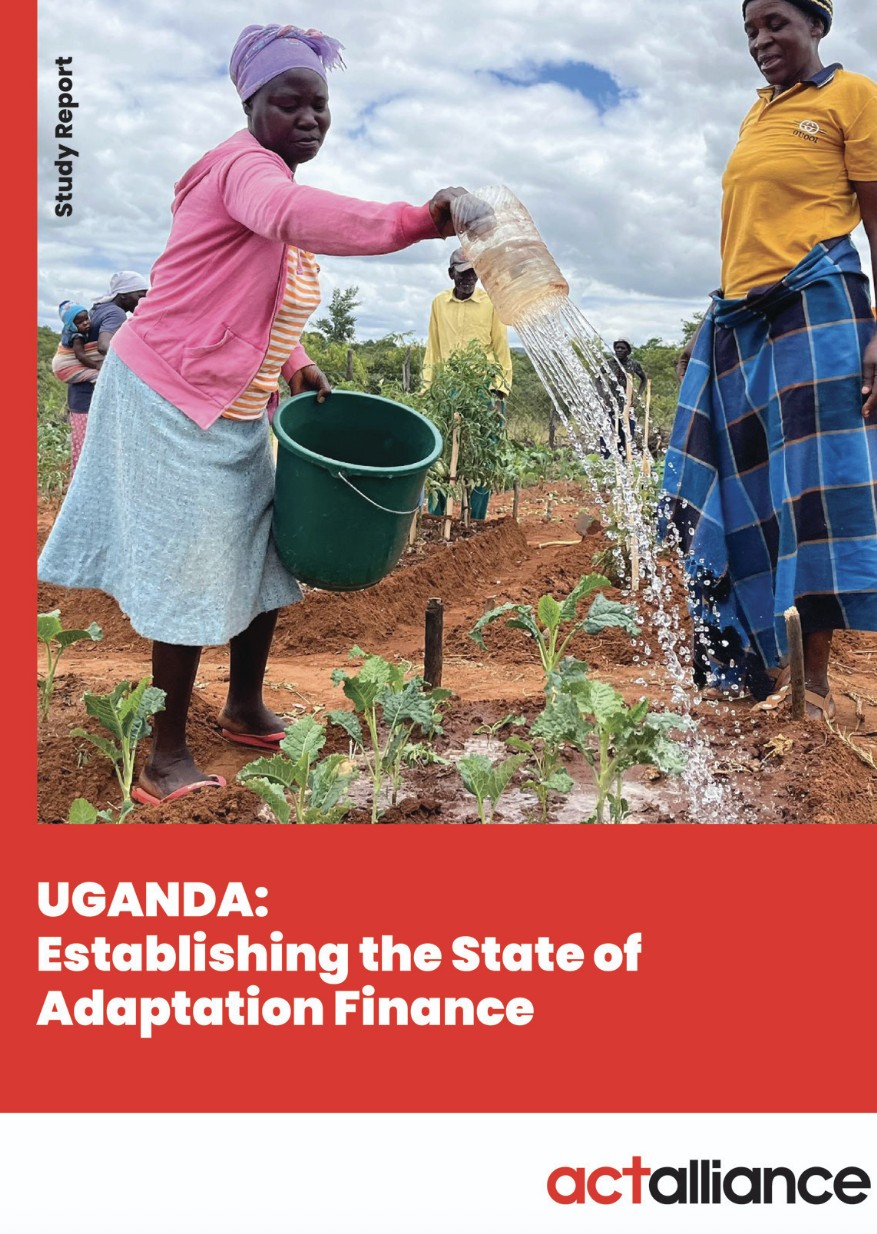
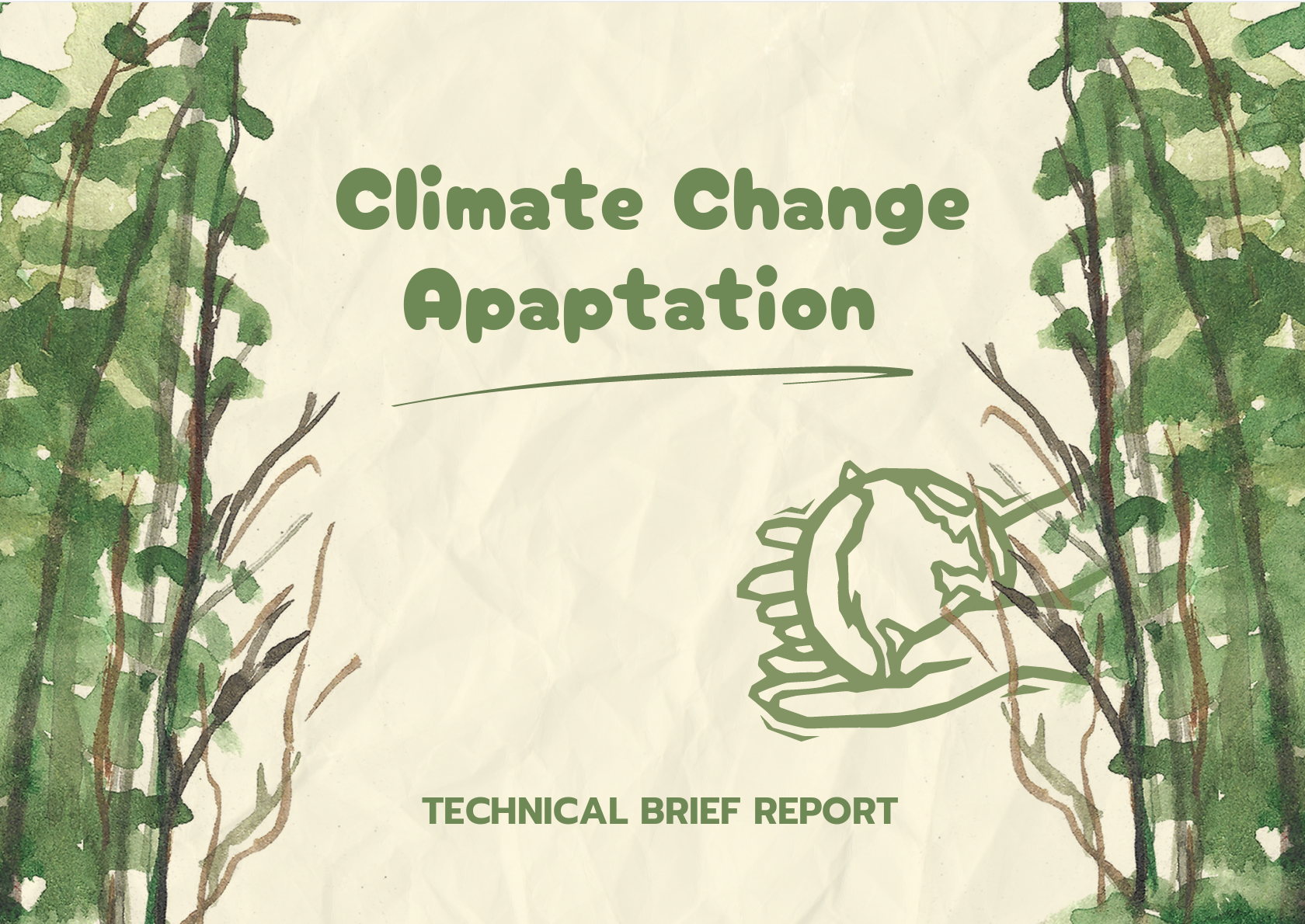
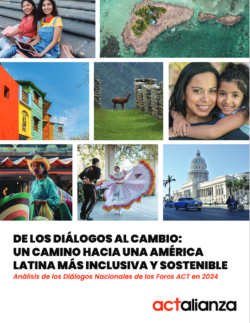
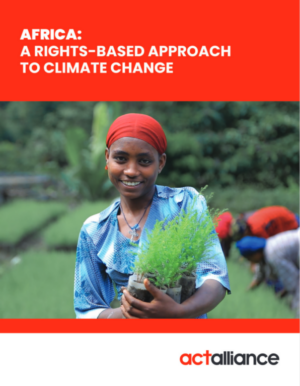
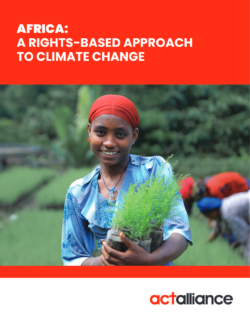

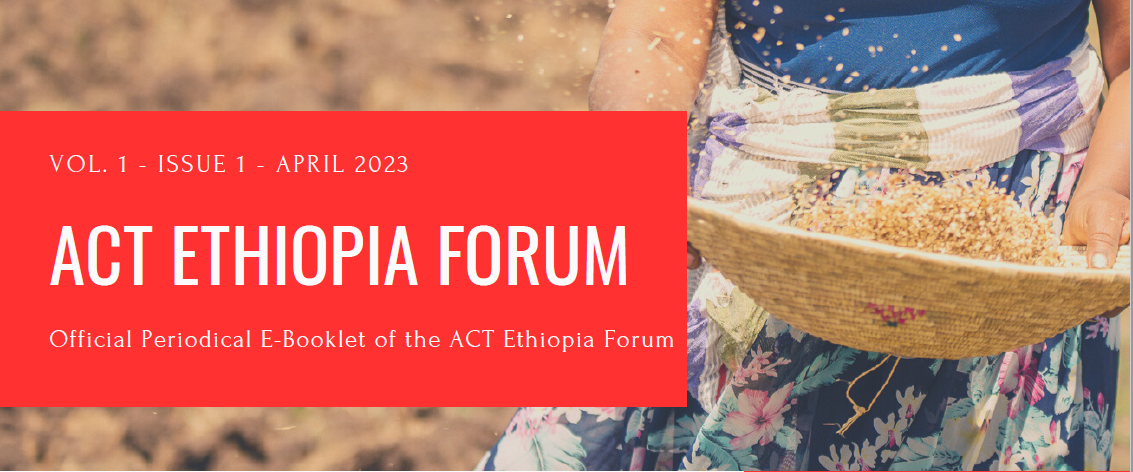
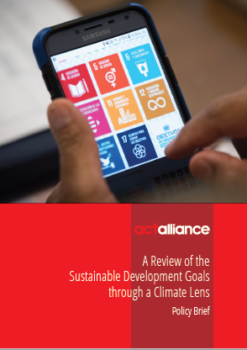
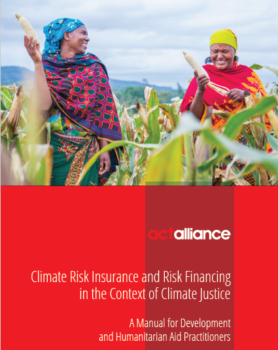 ACT Alliance’s latest publication:
ACT Alliance’s latest publication: